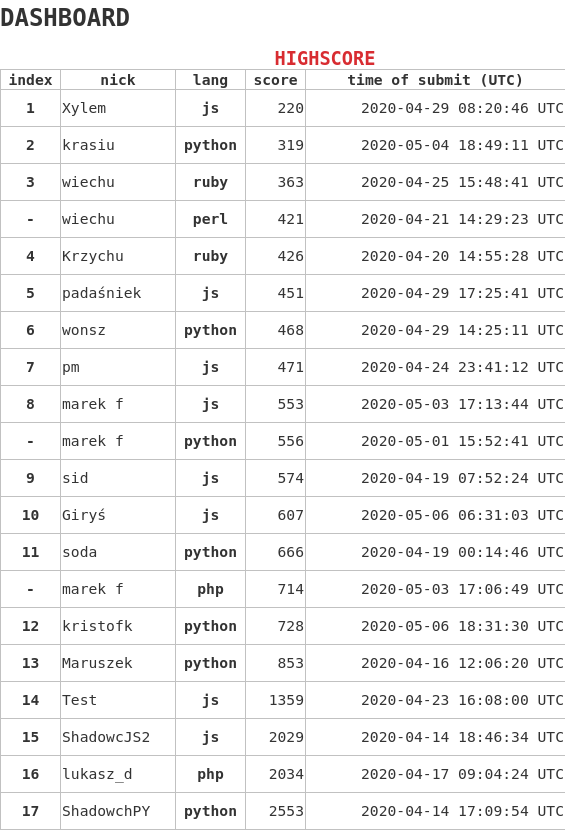- The program performs a simulation of an epidemic simulation and prints ASCII's map of people (see examples).
- The output must be printed to STDOUT.
- The output must have a newline char
(\n)at the end. - Program gets 2 arguments (argv)
- Arguments are always valid.
- First argument
Kis an integer defining the number of iterations. - Second argument is a string representing the population separated with commas (see description of the
XYSQcode below). - Each line must have newline char (\n) at the end.
- The last line must not have any characters after newline char
(\n).
Inspiration for this golf is another simulation created by Washington Post (https://www.washingtonpost.com/graphics/2020/world/corona-simulator/).
The goal of this golf is to create a simulation of a virus spreading across the population.
$ ./task 10 22H0,33S0
........
........
........
.S......
....S...
........
........
........
The area is always 8x8 size.
Each person is described with the XYSQ code, where:
- X - position in
Xaxis, from 0 to 7; - Y - position in
Yaxis, from 0 to 7; - S - State of the person, we have 3 states:
- H - Healthy person, can be infected;
- S - Sick person, can infect healthy person and after 14 iterations changes to R state;
- R - Recovered person, cannot be infected;
- Q - Quarantine state, 0 or 1, if
Q is 1<then the person can't move; - Additionaly, the person has a hidden
Nvalue - it's a grain for random moving (please see step flow). Initial value isn = (x << 2)^7 * (y << 3)^5where:- << is a bit shift
- ^ is a XOR operation
function next_iteration(P) {
for (person in P) { // iterate in a sequence
person.s = cure(person.s)
person.n = gen_n(person.n)
[new_x, new_y] = gen_new_cords(person)
if (point {new_x, new_y} is free and person.q == 0) {
person.x = new_x
person.y = new_y
}
if (person.s == H and in the neightbourhood (use Moore) is a sick individual) {
// https://en.wikipedia.org/wiki/Moore_neighborhood
person.s = S
}
}
}
function cure(state) {
if (state == S and 14 iterations has passed since the individual got sick) {
return R
} else {
return state
}
}
function gen_n(n) {
n ^= n << 13
n ^= n >> 17
n ^= n << 5
return n % (1 << 30)
}
function gen_new_cords(person) {
x = person.x
y = person.y
switch(person.n modulo 4) {
case 0: x += 1
case 1: x -= 1
case 2: y += 1
case 3: y -= 1
}
// wrap points, like in pacman game
if (x >= WIDTH) x -= WIDTH else if (x < 0) x += WIDTH
if (y >= HEIGHT) y -= HEIGHT else if (y < 0) y += HEIGHT
return [x, y]
}$ ./task 1 25H0,32S0,46R1,63H1,76S1
........
........
........
...S..H.
........
...H....
....R..S
........
$ ./task 2 25H0,32S0,46R1,63H1,76S1
........
........
........
....S.H.
...S....
........
....R..S
........
$ ./task 14 25H0,32S0,46R1,63H1,76S1
.R......
........
........
......S.
.......S
........
....R..R
........
$ ./task 20 25H0,32S0,46R1,63H1,76S1
.R......
........
........
......RR
........
........
....R..R
........
